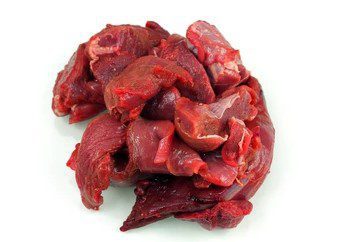

Wild boar meat is a nutritious source of lean protein and low cholesterol for dogs, but it must be properly prepared to avoid disease-causing bacteria and parasites.
Wild boar meat offers higher levels of essential vitamins and minerals, including vitamin B6, zinc, iron, niacin, thiamine, and selenium, that support healthy cardiovascular, immune system, and metabolism function in dogs. It also aids in muscle and organ function, provides energy for physical activity, promotes growth and development, and maintains skin and coat health. Wild boars’ natural diet and lack of antibiotics and hormones make their meat a healthier option for dogs.
Raw wild boar meat may contain trichinella parasites, leading to trichinellosis symptoms such as diarrhea, vomiting, stomach upset, weakness, and rash. Proper handling and cooking, including cooking to an internal temperature of 160F, is necessary to eliminate these risks. Lower temperature cooking, microwave cooking, smoking, and curing do not kill potential parasites. For a raw diet, freezing the meat for three weeks before feeding can eliminate and prevent parasites.
Wild boar meat must be correctly handled and cooked before serving to dogs. Cook to an internal temperature of 160F to eliminate bacteria and parasites. For raw diets, freezing the meat for three weeks before feeding is necessary to eliminate and prevent parasites.
Wild boar meat, also known as pork meat, is a nutritious source of lean protein and low cholesterol for dogs. It has its origins in the wild and is now widely used in various cuisines worldwide. Wild boar meat offers several benefits for dogs like supporting healthy cardiovascular, immune system, and metabolism functioning. It is also rich in vitamins and minerals that promote growth, development, and maintain skin and coat health. Wild boars' natural diet and lack of antibiotics and hormones make their meat a healthier option for dogs. However, raw wild boar meat may contain trichinella parasites that may cause several symptoms. Therefore, proper handling and cooking is crucial to eliminate these risks. Freezing the meat for three weeks is necessary for raw diets. Wild boar meat is affordable and easily accessible in most supermarkets.
If you're looking to serve wild boar meat to your dog, cook it to an internal temperature of 160F. Sudden changes may cause digestive issues in dogs, so serve a small amount initially. If your dog is allergic to pork, try alternative meats like bison or venison, which offer similar nutritional value. Have you ever fed wild boar meat to your dog? Which other meats does your dog enjoy?
Lastly, don't forget to treat your pet with love and care. Your furry friend deserves all the attention and care in the world!